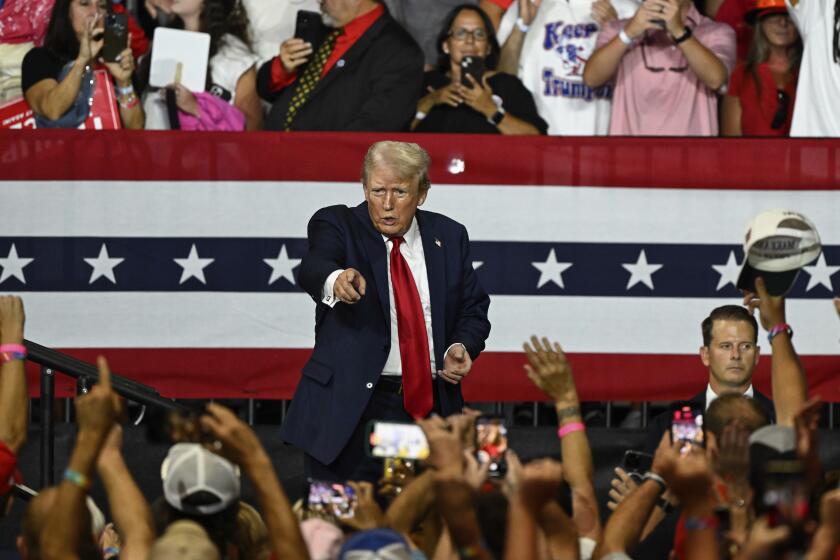Panel Votes Freeze on Arms Spending : Republican Senators Rebuff Reagan in First Crucial Test on 1986 Budget
The Republican-controlled Senate Budget Committee, breaking sharply with President Reagan in its first crucial test on the fiscal 1986 budget, voted overwhelmingly Tuesday to freeze defense spending next year at this year’s level, adjusted for inflation.
The vote was 18 to 4, with Republicans splitting 8 to 4 for the freeze and all 10 Democrats supporting it. Reagan has asked for after-inflation growth of about 6% next year for defense.
The committee acted as it began consideration of an alternative to the President’s spending plan. And while the action lends momentum to a variety of proposals to cut Reagan’s military buildup, the freeze still lacks the support that Senate Republican leaders believe it needs for passage in the full Senate.
Many of the committee’s Republicans who supported the defense freeze have long ranked deficit reduction as more important than Reagan’s defense buildup. But in the full Senate, the leaders of the opposition to dramatic reductions in the Administration’s military spending request are such influential Republicans as Armed Services Committee Chairman Barry Goldwater of Arizona and Ted Stevens of Alaska, chairman of the Appropriations subcommittee on defense.
Hits ‘Caterwauling’
Democratic Sen. Ernest F. Hollings of South Carolina, who sponsored the freeze in the Budget Committee, said: “I don’t want to hear any caterwauling over there (at the Defense Department). They’ll keep their programs and their contracts going.”
Hollings’ plan would slash a total of $115 billion from the defense spending authority that Reagan has sought for the next three years. After the freeze in fiscal 1986, which begins Oct. 1, it would allow military spending authority to grow by 3% a year, after inflation, in 1987 and 1988.
Hollings’ inflation adjustment is based on a Congressional Budget Office estimate that prices will increase slightly more than 4% each year. Thus, his plan would allow a real increase of a little more than 4% in 1986 and 7% in 1987 and 1988.
The committee approved the freeze after rejecting a more drastic proposal by Sen. Donald W. Riegle Jr. (D-Mich.) to hold defense spending growth below inflation during the coming year.
Budget Committee Chairman Pete V. Domenici (R-N.M.) supported the Hollings proposal and abandoned his own defense spending plan, which would have allowed a 3% increase in defense spending authority after inflation in fiscal 1986, about half of what the Administration had asked.
The committee made the dramatic move in the controversial defense area with relatively little debate. To many senators, support of Reagan’s proposed reductions in domestic spending is contingent on slicing his defense budget.
“This is the key to a lot of other (decisions) that are going to be made yet in the next few days,” Sen. Charles E. Grassley (R-Iowa) said shortly before the committee began voting on various defense spending options.
“You’re not going to get a bunch of politicians to go through all the pain and agony (of deficit reduction) and only go halfway,” agreed staunchly conservative Sen. William L. Armstrong (R-Colo.), shortly before he backed the Hollings proposal.
Last May, both Grassley and Armstrong supported an unsuccessful effort to freeze all government spending, including defense. But while eight of the 12 Budget Committee Republicans supported the defense freeze Tuesday, only five of them voted for the across-the-board freeze last year, suggesting a possible shift among Republicans toward a freeze.
‘Year of the Freeze’
Sen. Slade Gorton of Washington, a moderate Republican who also supported the Hollings plan, said: “He’s right about this one for a number of reasons. . . . This is the year of the (budget) freeze.”
However, Sen. Gary Hart (D-Colo.) cautioned after the vote: “You can’t form any conclusions from it, except that the logjam was broken in bringing defense under the umbrella of cuts. . . . I don’t think any pattern was formed here.”
Separately, in another Senate hearing on the budget, Sen. Lowell P. Weicker Jr. (R-Conn.), chairman of the Appropriations subcommittee on labor, health and human services and education, launched a blistering attack on the Administration’s proposed cuts in domestic spending.
“The tough choices are being made by the tough and the well-off to the detriment of the weak,” Weicker told Health and Human Services Secretary Margaret M. Heckler during a subcommittee hearing.
‘Survival of the Fittest’
He contended that the Administration’s “guiding philosophy” as it has built up the military and cut a wide range of domestic programs has been “survival of the fittest.”
However, Heckler contended that her department has been successful in training welfare recipients for jobs and that it has had “colossal outlays” in Social Security. The Administration has proposed cutting the department’s budget by $7.5 billion, to $330.3 billion.
Weicker, staring straight across the witness table at Heckler, said the Appropriations Committee has waged “one long protracted struggle with the Administration” to maintain and increase funding for education, health, science and other social programs.
More to Read
Get the L.A. Times Politics newsletter
Deeply reported insights into legislation, politics and policy from Sacramento, Washington and beyond. In your inbox three times per week.
You may occasionally receive promotional content from the Los Angeles Times.










